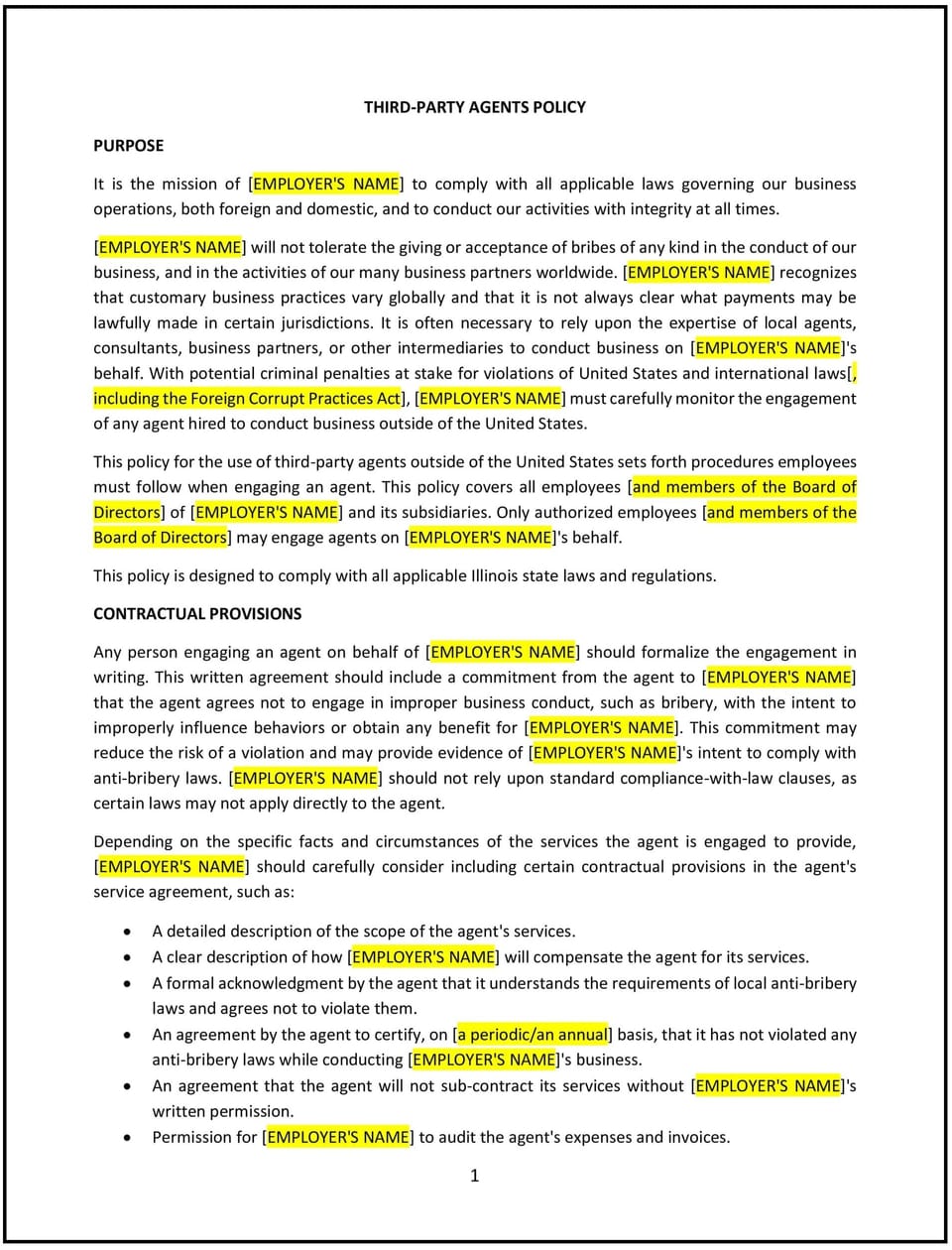Third-party agents policy (Illinois): Free template

Third-party agents policy (Illinois)
This third-party agents policy is designed to help Illinois businesses establish guidelines for working with external agents, contractors, or representatives. It provides standards for selecting, managing, and monitoring third-party agents to strengthen compliance with Illinois laws, ethical practices, and company policies.
By adopting this policy, businesses can mitigate risks, maintain accountability, and protect their interests when engaging with third-party agents.
How to use this third-party agents policy (Illinois)
- Define third-party agents: Specify who qualifies as a third-party agent, such as contractors, consultants, or representatives acting on behalf of the business.
- Establish selection criteria: Outline the requirements for selecting third-party agents, including qualifications, experience, and references.
- Address contractual obligations: Require formal agreements detailing the scope of work, responsibilities, and compliance expectations for third-party agents.
- Include compliance requirements: Emphasize adherence to Illinois laws, ethical standards, and company policies, such as anti-corruption and confidentiality requirements.
- Monitor performance: Implement regular performance reviews and audits to ensure third-party agents meet contractual and compliance obligations.
- Provide training: Offer training or resources to third-party agents on relevant company policies and legal requirements.
- Include termination guidelines: Specify conditions under which the relationship with a third-party agent may be terminated, such as non-compliance or performance issues.
- Maintain records: Document agreements, communications, and performance evaluations to ensure transparency and accountability.
Benefits of using this third-party agents policy (Illinois)
This policy provides several benefits for Illinois businesses:
- Promotes accountability: Establishes clear expectations and responsibilities for third-party agents.
- Reduces risks: Mitigates potential legal, financial, and reputational risks associated with third-party engagements.
- Enhances compliance: Aligns with Illinois laws and ensures ethical practices are followed by all representatives.
- Improves performance: Provides a framework for monitoring and evaluating third-party agents’ effectiveness.
- Protects interests: Safeguards company assets, intellectual property, and reputation through clear guidelines and oversight.
Tips for using this third-party agents policy (Illinois)
- Communicate the policy: Share the policy with third-party agents during onboarding and include it as part of contractual agreements.
- Conduct due diligence: Vet third-party agents thoroughly before engagement to ensure alignment with company values and compliance standards.
- Train internal teams: Provide training to employees who manage third-party relationships to ensure consistent oversight.
- Use performance metrics: Establish measurable criteria to evaluate the effectiveness and compliance of third-party agents.
- Update regularly: Revise the policy to reflect changes in Illinois laws, company practices, or industry standards.
Q: Who qualifies as a third-party agent under this policy?
A: Third-party agents include contractors, consultants, vendors, or representatives acting on behalf of the company in any capacity.
Q: What are the requirements for selecting a third-party agent?
A: Selection criteria include relevant qualifications, industry experience, references, and agreement to comply with company policies and Illinois laws.
Q: Are third-party agents required to sign a formal agreement?
A: Yes, all third-party agents must sign a formal agreement detailing the scope of work, responsibilities, and compliance requirements.
Q: How is third-party agent performance monitored?
A: Performance is monitored through regular evaluations, audits, and feedback mechanisms to ensure adherence to contractual and compliance obligations.
Q: What happens if a third-party agent violates this policy?
A: Violations may result in corrective actions, contract termination, or legal proceedings, depending on the severity of the breach.
Q: Are third-party agents provided with company training?
A: Yes, relevant training or resources may be provided to ensure third-party agents understand and comply with company policies and legal requirements.
Q: How are records of third-party engagements maintained?
A: All agreements, communications, and performance evaluations are documented and securely stored to ensure transparency and accountability.
Q: How often is this policy reviewed?
A: This policy is reviewed annually or whenever significant changes occur in Illinois laws, company practices, or industry standards.
This article contains general legal information and does not contain legal advice. Cobrief is not a law firm or a substitute for an attorney or law firm. The law is complex and changes often. For legal advice, please ask a lawyer.


